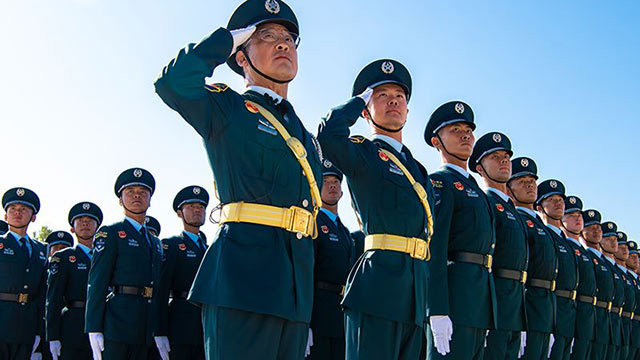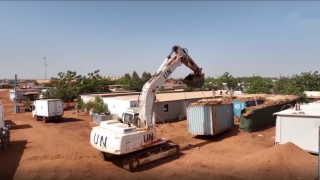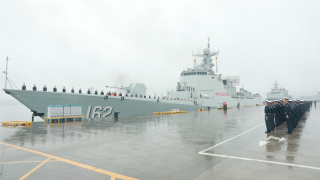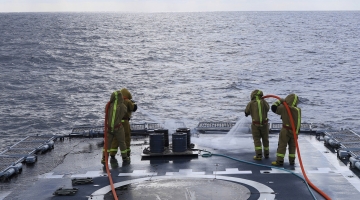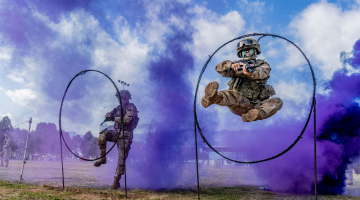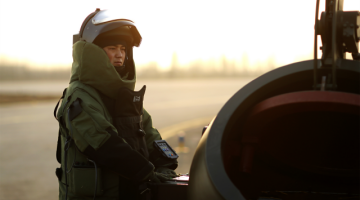By Ling Yunzhi
India's comprehensive national strength has been increasing in recent years, and its demand for modern weapons and equipment has correspondingly been growing. However, due to its limited technical and industrial infrastructure levels, it cannot but seek external support in weapons research and development. According to Sputnik's reports, France and India have recently signed an agreement on cooperation in the field of the submarine Air Independent propulsion (AIP). This technology serves to offer a great advantage to conventional submarines by increasing their endurance for several weeks, which enables them to remain underwater for extended periods of time, and grow to be "quasi-nuclear submarines" in a sense.
France is one of the few countries in the world willing to provide technology transfer of weapons to India. Against the background of more and more attention paid to the Indo-Pacific region in recent years, France has proactively promoted military cooperation with India in order to promote its regional strategic layout. It can be predicted that driven by their respective interests and needs, the India-France defense cooperation is sure to continue to deepen and thus promote the continuous development of the strategic relationship between the two countries.
India: Ambitious submarine modernization
India has always been weak in submarine strength: only possessing less than 20 active submarines at present, most of which are outdated to be eliminated. In view of this, India has put forward an ambitious submarine-building plan that envisages the construction of submarines to 24 in total, including at least 18 conventional ones and 6 nuclear-powered attack ones. The conventional submarines, among others, will be fitted with modern equipment, weapons and sensors, including AIP technology based on fuel cells, advanced torpedoes, modern missiles and countermeasures systems.
However, India has also recognized that due to its low-level industrial base and limited strength, the plan above can only be achieved with external technical assistance. Due to the high sensitivity of submarine technology, few Western countries were willing to provide assistance to India, especially the United States. Although the United States has made significant progress in military cooperation with India in the past decade, there are still concerns about India's technical security, and it is unwilling to provide substantive assistance to India in submarine construction.
However, France is an exception. France has a long history of building submarines and kept open to technology transfer as required by India, so naturally, France has become the target country that India has focused on in seeking foreign technical assistance. As early as 2005, India signed a contract with France to build six conventional submarines by itself with significant technical support from France. According to the original plan, all six submarines should have been delivered by 2018. However, the Indian Navy has only had five submarines commissioned so far due to various reasons with the sixth one yet to be delivered, which has made the modernization progress of Indian submarines greatly delayed, with the Indian Navy having to face a serious crisis of equipment insufficiency in quantity and aging in the next few years.
To solve the problem, India has launched a bid again in 2021, planning to build another six advanced conventional submarines, including those equipped with an AIP system and capable of operating the Brahmus supersonic cruise missiles through the vertical launch system. In addition, India has also insisted that these submarines should be built locally under the framework of "Made in India" and that the complete transfer of submarine technology should be realized, which led to the withdrawal of Western countries including France, ultimately coming to the failure of the bidding. This time, the India-France cooperation agreement on submarine AIP is actually a remedy for the failure of the bid mentioned above and tries to achieve the local design and construction of the submarines through a more flexible way of technical cooperation while improving India’s overall operational capability underwater.
France: Increase of military influence in the Indo-Pacific region
For France, strengthening its strategic relationship with India and expanding its influence in the Indo-Pacific region has always been the consensus reached by previous governments. In fact, France has long regarded itself as a stakeholder in the Indo-Pacific region and maintained an active military presence in the region. For instance, France has had about 4,200 service members stationed on Reunion Island and Mayotte Island, which are of strategic significance to France in the Indian Ocean region, including one para regiment, two frigates, two patrol boats, two transport aircraft and one infantry detachment, in a view to effectively ensuring the safety of French shipping in the Indian Ocean. In recent years, with the continuous improvement of the Indo-Pacific region status across the world, France has increased its strategic focus on the region, and India, as the pivot country of the Indo-Pacific region, has also had its status in France's foreign strategy ever improving.
In May 2022, India announced in the Quadrilateral Security Dialogue (QUAD) of the United States, Japan, India and Australia that it would join the Indo-Pacific Partnership for Maritime Domain Awareness and that it would promote the establishment of a free and open Indo-Pacific region, which just coincided with France's strategic attempt. France believes that the development of extensive and in-depth strategic cooperation and military activities with India will greatly enhance France's strength distribution and geographical pattern in the Indo-Pacific region. To this end, French President Emmanuel Macron has expressed on various occasions that France has always regarded India as one of the most important partners.
At the same time, countries like the United States, Russia, and Israel, are also competing to market military purchase orders targeting India. Under the fierce competition, France among others has dropped from the second-largest defense partner of India 10 years ago to the fourth as of now. In particular, after the creation of an enhanced trilateral security partnership called AUKUS —Australia, the United Kingdom, and the United States in September 2021, Australia canceled a large contract to purchase 12 French conventional submarines with a value of AUD 90 billion, and instead purchased eight nuclear-powered submarines capable of carrying out long-range missions from the United Kingdom, and the United States. This has caused even greater dissatisfaction in France and made France further increase its attention paid to the Indo-Pacific" region.
In addition, the Russia-Ukraine conflict has also become an important factor in promoting France to strengthen its defense cooperation with India. After the outbreak of the Russia-Ukraine conflict, Russia's military-industrial capability has been under severe impairment. As a major importer of Russian equipment, India has been trapped in a shortage of missile systems, frigates, submarines and other equipment components and delays in delivery. In view of these, India has been negotiating with various suppliers to obtain equipment components from various channels, though with little effect achieved. Under such circumstances, France has strengthened its cooperation with India in weaponry and technology. Recently, Mr. Emmanuel Lenain, French Ambassador to India, also said that France and India have kept long-term cooperation on submarine, and France is willing to cooperate with India on key projects, including nuclear-powered submarine construction, and has promised to provide the best technology to the Indian military without any additional conditions. The submarine technology upgrade agreement between the two countries also serves as an important measure to promote the continuous warming of military cooperation and expand France’s influence in the Indo-Pacific region by using the "window period" of the Russia-Ukraine conflict; meanwhile, the measure will also serve to greatly enhance France's military presence and strategic deterrence in the Indo-Pacific region.
Defense relations: Ever deepening, though hard to achieve leapfrog development
From the perspective of future development, the bilateral military cooperation will continue to heat up and develop in a pragmatic direction under the influence of the external strategic adjustment of France and India, and driven by their respective interests. The substantial increase in military investment of the two countries will also become an important guarantee for deepening their defense cooperation. For instance, France has planned to allocate a defense budget of 44 billion euros (about US$48.1 billion) in 2023 to continue to promote modernization projects, strengthen the construction of defense industrial bases and foreign defense assistance; India will increase its defense budget to US$72.6 billion in the fiscal year 2023 to 2024, of which more than 1/4 will be used to purchase new weapons, aircraft, warships and other military hardware. All these are sure to provide strong financial support for deepening bilateral defense cooperation.
At the same time, since India and France have signed a series of military cooperation agreements, such as the Indo-French agreement on reciprocal logistics support for armed forces, with the interoperability between the two militaries further enhanced. It can be predicted that in the future, the two countries will further strengthen joint exercises and training, while using each other's military facilities, to promote the rapid development of bilateral defense relations.
However, we should also see that because there are still many differences between France and India in terms of strategic objectives, regional interests, security concepts and others, there are also many constraints existing in deepening defense cooperation in the future. For instance, although the willingness of the two countries to seek defense cooperation is very strong, the goals they are trying to achieve are not consistent. In recent years, India has paid more attention to the localization construction of weapons and equipment and attached greater importance to joint research and development and the complete transfer of advanced technology when purchasing weapons and equipment from abroad. However, due to India’s weak foundation in the defense industry, lack of necessary talent, and insufficient technology and industrial capacity, France is sure to, to a certain extent, lack confidence in joint research and development projects.
For France, the purpose of seeking defense cooperation with India is, on the one hand, to expand its arms market in India and gain more economic benefits, and on the other hand, to take the opportunity to expand its influence in the Indian Ocean and South Asia. Such movements are easy to make India, which has always regarded the relevant regions as its own "backyard", highly alert, and believe that this will pose a potential challenge to India’s maritime hegemony in the Indian Ocean, thus strengthening preventive measures. Under the influence of these factors, it will be difficult for India and France to achieve leapfrog development in defense relations in the future.
(The author is a researcher at the Center for Asia-Pacific Development Studies of Nanjing University)
Editor's note: Originally published on thepaper.cn, this article is translated from Chinese into English and edited by the China Military Online. The information and opinions in this article do not necessarily reflect the views of eng.chinamil.com.cn.


